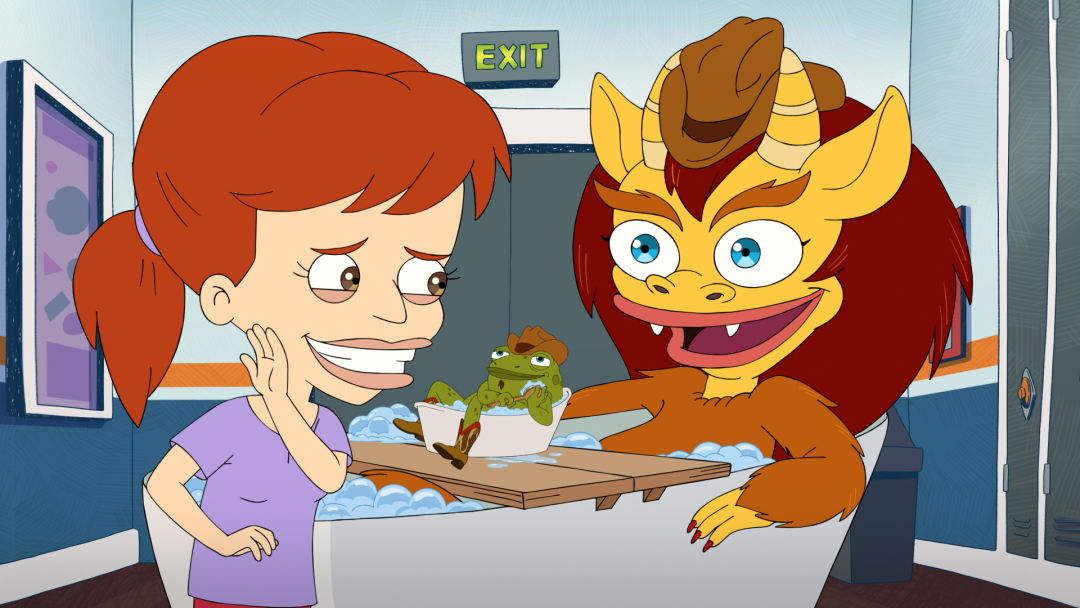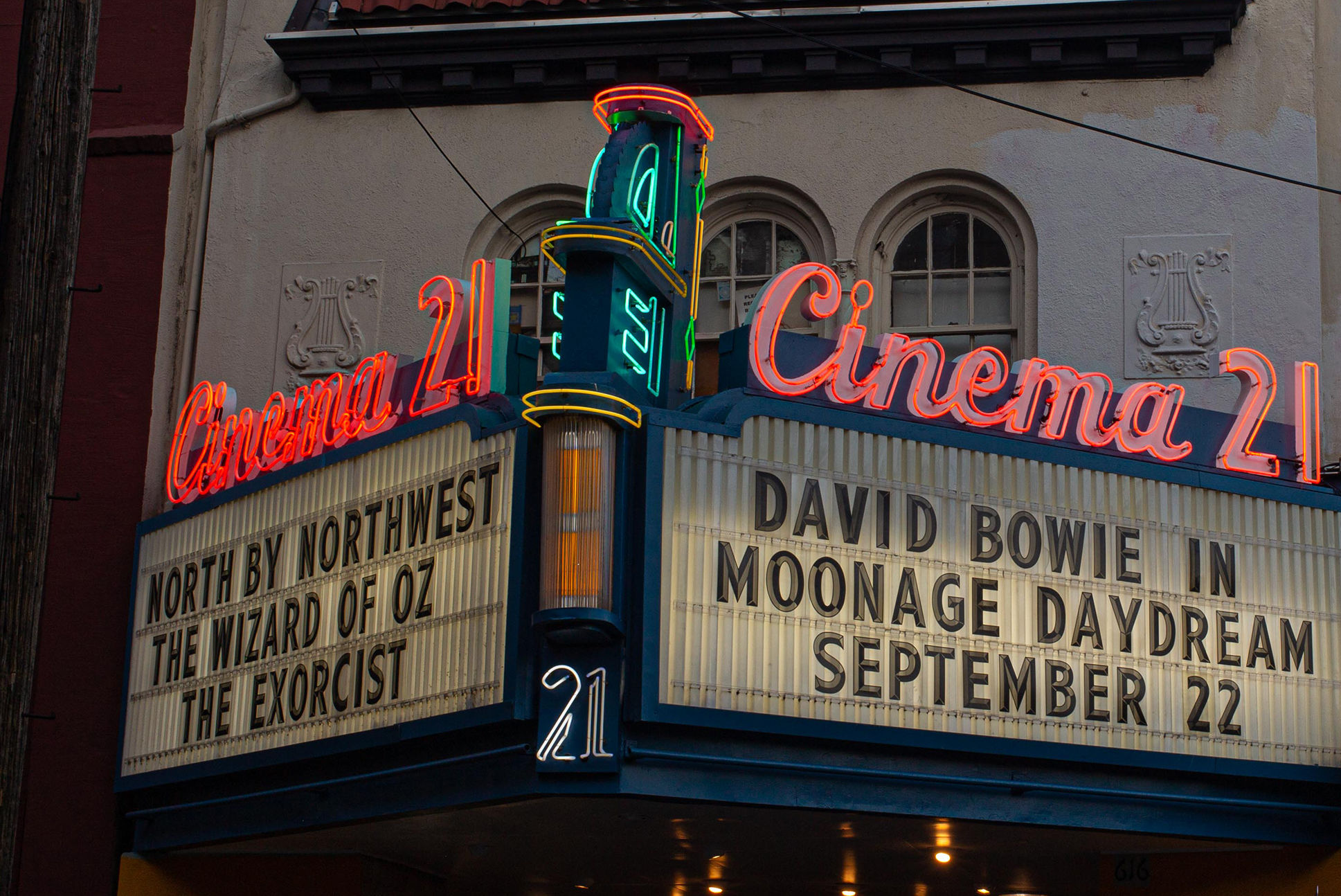Pop Culture Worth Your Time: European Soccer, Big Mouth, and More

Jessi (Jessi Klein) and Connie the Hormone Monstress (Maya Rudolph) in season four of Netflix's Big Mouth
Image: Netflix
2020 is almost over, but the pandemic is not. For at least the next couple months, we’re going to be hunkered down inside, waiting out the short days ’til spring shows up and sets us free. One key to survival? A killer content queue. Here’s the stuff we’re obsessed with at Portland Monthly this week, from queer midcentury romances to puberty cartoons and beyond.
Big Mouth
Carol
The "x is a Christmas movie" discourse is, at this point, tired, but also, Carol is a Christmas movie. Probably my favorite Christmas movie. Likely one of my favorite movies period. It's streaming now on Netflix, and if you haven't seen it, you must. If you have seen it, watch it again. If you just watched it, switch it on in the background to absorb its ambience and turn to the TV for key line readings: Cate Blanchett saying "flung out of space" and "where's the tape, you son of a bitch?"; Rooney Mara saying "I miss you" to a lonely dial tone; Carrie Brownstein saying two-and-a-half lines despite her confoundingly high billing in the opening credits.
I first saw Carol five Christmases ago at the Fox Tower, and I liked it, but it left me cold. I revisited it in a college queer cinema course, where it fully revealed itself to me, and it's risen in my esteem on every repeat viewing since. In my personal ranking of the catalogue of Todd Haynes—the sometime-Portlander whose films vary wildly from ’50s-style melodramas to punkish art school anti-biopics—it's second only to maybe Safe, his brilliant 1995 eco thriller starring a young, wispy Julianne Moore.
The story is small and simple and drenched in subtext: Therese Belivet (Mara) is a young New York City shopgirl in the mid-50s, and Carol Aird (Blanchett) is an impossibly glamorous older woman whom she encounters at work and falls in love with. Therese is young, timid, and unsure of her own queerness—she has a half-relationship with a handsome dummy played by Jake Lacy, king of handsome dummies. Carol, for all her outward allure, is battle-torn: locked in a bitter custody fight with her estranged husband (Kyle Chandler) and worried that, if she doesn't seize what's blossoming with Therese, her upper-crust life might snuff out her inner flame entirely. They go on a road trip to Chicago. Complications ensue.
The woman don't say all that much to each other. They glance and touch and speak in ellipses, and Haynes's camera catches it all. Like his hero Douglas Sirk, Haynes emphasizes domestic suffocation by locking his heroines behind columns and windows and refracting them in mirrors. Mara captures a specific mix of passion, trepidation, and emergent confidence that will bowl you over if you let it. The period costumes by Sandy Powell are exquisite, and Blanchett wears them like armor. Carter Burwell's exquisite score tugs at our emotions, and Haynes's rigorous subtlety grounds our minds. It is scientifically impossible not to cry at the end of this movie. A stone would be overwhelmed.
Come for the wintry setting (Patricia Highsmith's The Price of Salt, the film's source novel, features some of my all-time favorite writing about the season), stay for the sensory feast, and leave with your soul a little fuller than it was when you woke up. —Conner Reed, arts & culture editor
I Want to Be Where the Normal People Are
I have had my heart a little bit broken before by books written by iconic female comedians. For instance, I'd be very happy to move to Leslie Knope's Pawnee, Indiana and take a job in the Parks and Recreation Department, yet Amy Poehler's Yes Please left me cold. I've returned to Tina Fey's Bossypants on occasion, but just to read her heartbreaking "Prayer for My Daughter" ("When the Crystal Meth is offered/May she remember the parents who cut her grapes in half/And stick with beer."). And I didn't make it through Mindy Kaling's Is Everyone Hanging Out With Me?, even though Never Have I Ever is one of my favorite shows of 2020.
So it was with trepidation that I picked up the latest from Rachel Bloom, the creator of Crazy Ex-Girlfriend, a cult television show from the CW that appeared precisely designed for not even so much my demographic as for me, the individual. There's musical theater, and a lot of Jewish humor, and frank exploration of mental health and more musical theater and I treasure nearly every one of the show's four seasons worth of episodes (though I admit the Cats parody in Season 4 didn't do it for me, but that's because as anyone who likes musical theater, including Rachel Bloom, knows, Cats is the worst of all time period end of story.)
Her new book, I Want To Be Where the Normal People Are, works on a number of levels, including the sly, clear subtext present in the title: There is no such thing as "normal," you ding-dongs! Haven't you been listening? Bloom's been trying to tell us that all along. So we get a deep-dive into her childhood neuroses, from being ferociously bullied at school (and certain that if she just performs "Adelaide's Lament" from Guys and Dolls during the school talent show, the popular kids will welcome her to their crowd) to subtler but no less insidious bullying as a young staffer in a mostly all-male Hollywood writer's room.
I would have liked more about her experiences on Crazy Ex-Girlfriend, and cringed my way through the most personal of the chapters—I had to stop reading for a bit when she delves into her toileting trauma—but on the whole, I was grateful for the chance to have a conversation, even if in my head, with one of my heroines. That's normal, right? —Julia Silverman, news editor
UEFA Women's Championship League
A die-hard Portland Thorns fan who doesn’t actually know much about the game outside of Providence Park, I dabbled last winter in international club soccer fandom with an ESPN+ subscription to follow Australia’s W League, where some Thorns had gone to play for the offseason. I’ve always been a little intimidated by the vastness of European soccer and what’s seemed to be the deep knowledge of its followers, but the Australian league is about the same size as the one in the US, and it proved to be a very manageable gateway drug to paying attention to the sport in the rest of the world. It also offered a dark preview of the year to come, with some teams losing their stars to England midseason, games played in nasty wildfire smoke, and the league final, in March, happening in an empty stadium as the worldwide pandemic settled in.
This fall, with the US’s National Women’s Soccer League having had such an abbreviated season (the Thorns played only 10 games in 2020, instead of the usual 24-plus), the wee Australian league not starting play till practically New Year’s, and so many familiar NWSL players popping up on European rosters, I’m attempting to level up my fandom again and actually follow games across the Atlantic. I’m a novice but am slowly figuring out the leagues, the tiered divisions, and the overlapping jurisdictions of competition. This week, my attention is with the UEFA Women’s Championship League’s knockout round of 32, a set of two-game matchups (also called, I have just learned after some confusion, “ties”) whose first legs were played Wednesday morning (Pacific time) and whose second legs happen December 16. I watched one of the first legs live with a free 30-day subscription to a Manchester City fan app (which I need to remember to cancel at some point, or I’ll be on the hook for 2 euros), and am searching up highlights and dusting off my high school French to read recaps.
𝙐𝙣𝙚 𝙫𝙞𝙘𝙩𝙤𝙞𝙧𝙚 𝙖𝙪 𝙢𝙚𝙣𝙩𝙖𝙡 💪🔴🔵#JuveOL pic.twitter.com/RsG8yCZCwe
— OL Féminin (@OLfeminin) December 9, 2020
Already, there’s drama, with former Thorn Amandine Henry’s normally dominant Olympique Lyonnais squad, which has won the Champions League the past five years, pulling ahead of Italy’s Juventus only in the final minutes of their first leg. Putting Manchester City one up on Sweden’s Göteberg with a second-half header, US Women’s National Team star Sam Mewis might be America’s greatest export to England since, I don’t know, T. S. Eliot? (I’m sure there’s a better example, but I woke up extra early for this experience and am a little sleepy as I write this.) I’ve also learned that some of the imagery and ethos of the early-’90s punk-rock riot grrrl movement has been coopted by a Scottish sportswear company that sponsors the Glasgow City team (which is trailing Sparta Prague after the first leg—maybe they should try some Huggy Bear or Bikini Kill as psych-up music for leg 2).
Spaced out to avoid overwhelming new fans like me (I’m sure that’s the reason and it has nothing to do with domestic league schedules and windows of international play), the round of 16 isn’t till February, and the tournament is set to wrap up in May, right around when the NWSL should be starting regular season play. —Margaret Seiler, managing editor




